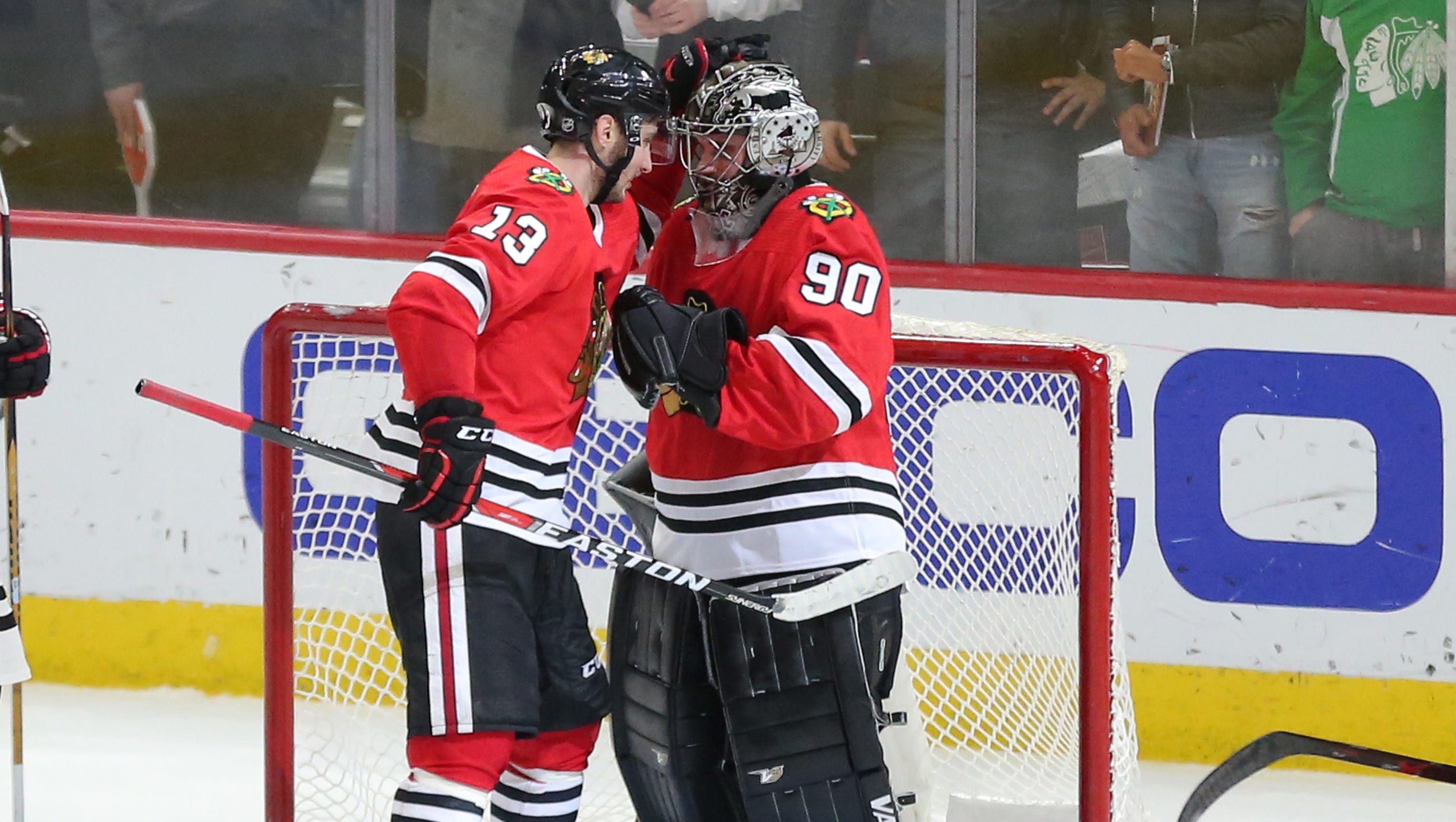It was a thrill of a lifetime for 36-year-old accountant Scott Foster when the Chicago Blackhawks called on him to play goalie. USA TODAY Sports
A 36-year-old accountant made seven saves for the Chicago Blackhawks in an NHL game Thursday night.
Yes, you read that correctly.
After starter Anton Forsberg was hurt during what coach Joel Quenneville described as a "pregame ritual," and backup Collin Delia cramped up early in the third period, the Blackhawks turned to Scott Foster, an emergency goalie and married father of two who plays in two recreational leagues. He signed a contract, put on his gear and then, amazingly, stopped all seven shots he faced.
"The initial shock happened when I had to dress," Foster told reporters after Chicago's 6-2 win over the Winnipeg Jets. "I think you just kind of black out after that."
In a postgame scrum with reporters, Foster estimated that he's attended 12 to 15 games this season as an emergency backup, which typically amounts to watching the game from the press box and eating dinner.
But not on Thursday night.
"A few hours ago I was sitting on the computer typing on a 10-key," Foster said. "Now I’m standing in front of you guys having just finished 14 and a half minutes of NHL hockey."
In honor of Foster's night in the spotlight, here's a quick primer on emergency goalies, how often they're needed and a few cases in which they've actually made an impact.
Why do NHL teams need emergency goalies?
For every NHL game, each team is allowed to dress 20 players: 18 skaters and two goaltenders. So if one of the goalies comes down with a stomach bug or some other sudden ailment on the day of the game, that team will try to recall a minor-league goalie to back him up. And if that isn't an option? Enter: Emergency goalies.
NHL rules state that if both of a team's goalies are forced out due to injury, a team is "entitled to dress and play any available goalkeeper." And more recently, the NHL has required home teams to maintain a list of available area goaltenders who could fill in for either team in a pinch.
How often do they actually play?
In a word: Rarely.
Jorge Alves, an equipment manager for the Carolina Hurricanes, was believed to be the first goaltender of the modern era to appear in a game when he suited up for the team last season. He spent seven seconds on the ice.
Others have come remarkably close, though. Eric Semborski, a youth hockey coach, dressed for the Blackhawks in 2016. Paul Deutsch, who owns an embroidery and screen print shop, was signed by the Minnesota Wild in 2011; he told reporters he hadn't played organized hockey since 1978.
Can anyone top Foster's night?
While there's never been a man-off-the-street situation like Foster's, the Blackhawks had another pretty legendary situation involving an emergency goaltender in 1938 — and in the Stanley Cup Finals, no less.
The story, as outlined by The Los Angeles Times and others, goes like this: The Blackhawks were set to play the Toronto Maple Leafs in Game 1, but their starting goaltender learned on the day of the game that he had broken his toe in the last game. The backup goaltender couldn't make it to Toronto in time. So the Blackhawks were forced to sign minor-leaguer Alfie Moore, who lived in the area.
Moore had played professional hockey at one level or another for a decade, but the twist is that on this day, he had supposedly been drinking.
"As the story goes, when Moore was picked to participate in the series, he was at a local bar," Brian Cronin wrote in The Times. "Various stories conflict over how drunk he was, but the main part of the story remained that he was plucked from a local bar on the afternoon of Game 1 and thrown into the Stanley Cup Finals."
Chicago went on to win the game, 3-1.
Contributing: Kevin Allen, A.J. Perez, Associated Press
Contact Tom Schad at [email protected] or on Twitter @Tom_Schad.


































